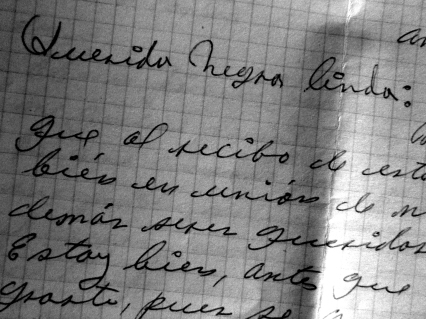March 15, 2010
Today we leave Havana. Our first stretch on the road will take us to the middle of the island, to the province of Villa Clara. We pack, say goodbye to the staff of the wonderful colonial palace that has been our home for the past week and get ready to hit the road, our luggage and equipment hardly fitting the van’s storage compartment. It’s very early in the morning and I am sitting in the hotel’s hall, organizing papers and reviewing notes for the next shoot. And then Florentino just shows up with a plastic bag full of letters.
I had been looking for letters for a long time and was getting worried that the material that I was finding was scarce and not so interesting. The letters I was looking for, letters written by Cuban soldiers from Angola, are at least 20 years old and most got lost when couples broke up, when people moved or were just thrown away after decades without any use.
Florentino had not been in Angola and had no letters (he had been in Nicaragua and even wrote a book about it). But he had mentioned that his father had been in the war in Angola for two years and that he had some letters. He promised to get them to me before I left Havana. I almost forgot about it in the midst of many other inconsequent leads and failed contacts.
And here is Florentino in front of me, at 7 AM, with a bag full of letters. Like a hundred or so, mostly from his father to his mother, but also to his grandmother and to Florentino and his siblings. The letters are beautiful. They are old poetic objects that have survived three decades inside this plastic bag, pieces of written love and anguish that made it across the ocean, intimate testimonies carefully preserved during the course of an entire life.
The letters will travel with us across the island and back. They will be deciphered and typed, read by different voices in different settings, interpreted in diverse tones and emotions.
Weeks later, when I finally give them back to Florentino I tell him how beautiful they are, how lovingly his father refers to his mother as “mi negra linda,” (my beautiful black woman). He tells me that it is still like this today – they are still together and call each other the exact same way.




Leave a comment